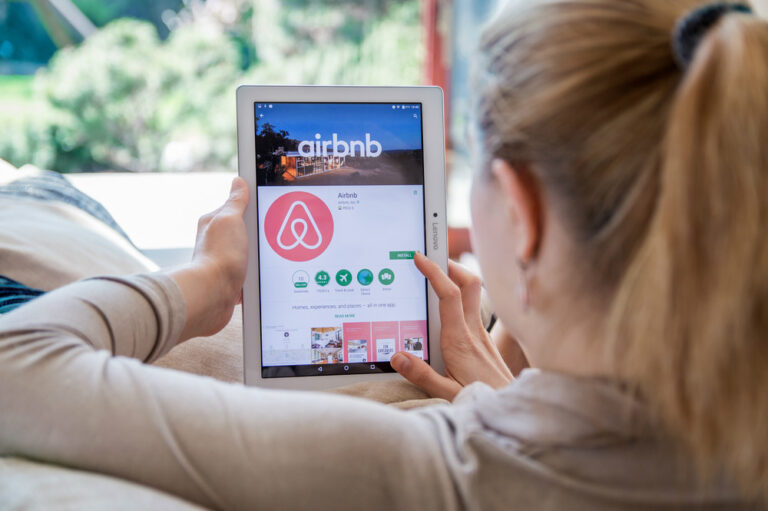As you are probably aware by now, you can use retirement funds to invest in real estate. Of course, you must adhere to all the IRS rules, especially UBTI, when doing so. A lot depends on the type of property you own, how you earn income from it, and what type of plan you are investing with. Holding an Airbnb in your IRA has become more popular. Many investors are looking into short-term rental options, as opposed to annual commitments. Both types of investments offer the investor many advantages.
Investing in Real Estate with an IRA
Real estate has always been the most popular alternative asset for self-directed retirement account investors. These types of accounts, such as the Self-Directed IRA and Solo 401(k) plan, allow one to use retirement funds however you see fit. By self-directing, you are control of your investment decisions and not limited to what a bank or other financial institution offers. So long as you don’t run afoul of the IRS rules, you have greater flexibility than just investing in the usual stocks, bonds and mutual funds.
Why is Real Estate so Popular?
For one, everyone needs a place to live, work and even build on. Plus, there’s only so much land to develop on this great planet. Eventually, the demand will far outweigh the supply, making it a great investment. Real estate, and other alternatives, also provide diversity in your retirement holdings. As the saying goes, don’t put all your eggs in one basket. Investing everything in the stock market is not the smartest decision you can make. On the other hand, neither is putting all of your retirement funds into one real estate property.
Of course, real estate is not without its risks. Everyone remembers the housing crash just over a decade ago. However, smart investors didn’t panic. Instead, they started buying up even more properties at a much better price. They new that real estate would bounce back and it quickly did.
There’s also a myriad of real estate investment options, whether it be commercial or residential. For those looking for a steady stream of income, a rental, even a short-term rental like airbnb, is very popular. Some might look into fix and flips, while others will buy and hold. Investing in raw land for future development may suit other investors.
Lastly, real estate is a hard asset, unlike stocks, which are considered “paper” assets. It’s great for one’s mindset that you can physically see and touch an investment. You also have the power to improve your property personally. Upgrading the appliances will help you receive more rent in an income property. Landscaping will raise the asking price of your flip house. Sweat equity is something real estate investors know all about.
Holding an Airbnb in Your IRA
Airbnb (check out their website), along with other platforms like HomeAway and VRBO, have become increasingly popular across the globe. The next logical step is to look at these properties as retirement assets. Weekly and/or monthly rentals have the potential to bring in more income than an annual renter. The downside is that you need to keep the space occupied most of the time to keep the money coming in. Of course, there may be more expenses, as the rental needs to be cleaned after each stay. Having a full-time might be a better option for many people. However, an Airbnb property can pay huge dividends.
This is especially true if you are in a desired area. Live close to the beach? Maybe you are near a theme park or arena. Perhaps, you are on the outskirts of a major city, where you can charge a little more per stay. As mentioned earlier, you need to stay within the IRS rules.
Check out our Podcast: Airbnb Options For Your IRA
The first rules, especially when real estate is involved, are the prohibited transaction rules. Specifically, it’s important to note the disqualified persons facet of the Internal Revenue Code (IRC). Essentially, any investment (including an Airbnb property) cannot involve a disqualified person. Your Self-Directed IRA is the only thing that can benefit from the investment held within. Disqualified people include yourself (the IRA owner), your spouse, your lineal ascendants and descendants and entities controlled by such persons.
A disqualified person cannot benefit from an IRA-owned asset, including real estate. This means one cannot utilize the Airbnb property, nor can they earn a salary doing work for such property. Some examples:
- You cannot personally live in a property your IRA owns.
- You’re not allowed to rent it out to your father, daughter or their spouses.
- You can’t hire your son-in-law to manage the property.
What About UBTI?
Unrelated Business Taxable Income, or UBTI, is a tax imposed on certain investments made with retirement funds, which includes real estate. This tax, which can go as high as 37%, can make an investment tax-inefficient. In regards to real estate, the UBTI can apply in different scenarios. The first one, is when you borrow money to purchase a property. Also, if your real estate investments go far enough to make it a business, you might get hit with the tax. There is one other situation where the UBTI comes into play when holding an Airbnb in your IRA.
The IRS does not offer much guidance on the use of Self-Directed IRAs and short-term rentals, such as Airbnb, especially with respect to the UBTI rules.
Payments for the use or occupancy of rooms and other space that render services to the occupant don’t constitute rent from real property.
Related: UBTI Rules
Rent from Real Property:
- The use or occupancy of rooms in hotels, boarding houses, or apartment houses furnishing hotel services,
- Tourist camps or tourist homes
- Motor courts or motels,
- Occupancy of space in parking lots, warehouses, or storage garages
Generally, services are considered rendered to the occupant if they are primarily for his/her convenience. Supplying maid service is an example of this kind of service. However, furnishing of heat and light, cleaning public entrances, exits, stairway and lobbies, etc. are not.
Therefore, it may appear that as long as you do not provide daily maid services or other convenience features like a daily breakfast, the investment should not be treated as a hotel or motel type of income stream. As a result, it may generate rental income that’s exempt from the UBTI tax rules.
Internal Revenue Code 469
An argument can be made that under IRC 469 – the rental income can be deemed active and not a passive investment if the average rental activity is less than seven days. Although, IRC 469 applies to the ability to take deductions under the passive activity loss rules, an argument can potentially be made that if under 469 the activity is deemed active, it could be subject to the UBTI tax
However, on the flip side, Schedule E, which is only required to be filed if the activity is passive and not active (Schedule C), does not have a day threshold as well and only focuses on level of ancillary activity. Hence, when doing short-term rentals with your Self-Directed IRA, it is important to be mindful of the potential application of the IRC 469 rules and the seven day threshold. Unfortunately, there is no direct guidance from the IRS under IRC 512 on short-term rentals.
As always, be sure to speak with a UBTI expert before engaging in such investments. Remember, the IRA Financial blog is for educational purposes, and you should always consult with a financial advisor before making any investment.
Should You Hold an Airbnb in Your IRA? – Conclusion
Of course, this can only be answered by each individual investor and their financial goals. Real estate will always be a popular investment. Short-term rentals, like Airbnb, are here to stay. Those with a prime location, can earn some serious income for their retirement plan. Of course, you have to be wary of the IRS rules to make sure the tax benefits of the IRA are not compromised.
If you have any questions about an Airbnb in your IRA, or about the UBTI rules, feel free to give us a call at 800.472.0646 today!











